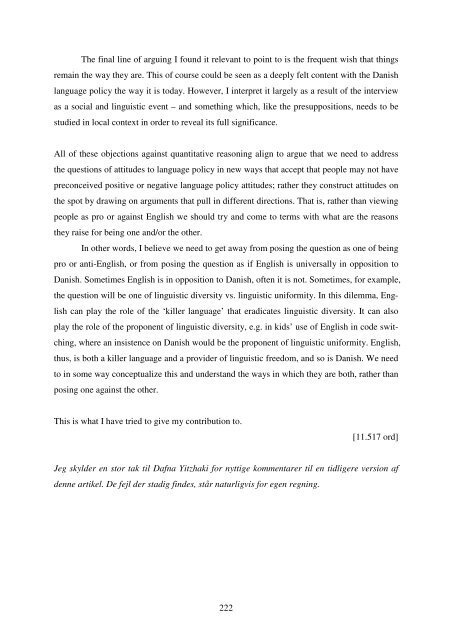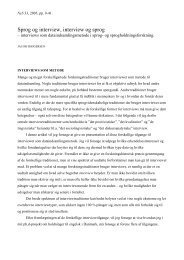Hør dog hvad de siger - Note-to-Self: Trials & Errors
Hør dog hvad de siger - Note-to-Self: Trials & Errors
Hør dog hvad de siger - Note-to-Self: Trials & Errors
You also want an ePaper? Increase the reach of your titles
YUMPU automatically turns print PDFs into web optimized ePapers that Google loves.
The final line of arguing I found it relevant <strong>to</strong> point <strong>to</strong> is the frequent wish that things<br />
remain the way they are. This of course could be seen as a <strong>de</strong>eply felt content with the Danish<br />
language policy the way it is <strong>to</strong>day. However, I interpret it largely as a result of the interview<br />
as a social and linguistic event – and something which, like the presuppositions, needs <strong>to</strong> be<br />
studied in local context in or<strong>de</strong>r <strong>to</strong> reveal its full significance.<br />
All of these objections against quantitative reasoning align <strong>to</strong> argue that we need <strong>to</strong> address<br />
the questions of attitu<strong>de</strong>s <strong>to</strong> language policy in new ways that accept that people may not have<br />
preconceived positive or negative language policy attitu<strong>de</strong>s; rather they construct attitu<strong>de</strong>s on<br />
the spot by drawing on arguments that pull in different directions. That is, rather than viewing<br />
people as pro or against English we should try and come <strong>to</strong> terms with what are the reasons<br />
they raise for being one and/or the other.<br />
In other words, I believe we need <strong>to</strong> get away from posing the question as one of being<br />
pro or anti-English, or from posing the question as if English is universally in opposition <strong>to</strong><br />
Danish. Sometimes English is in opposition <strong>to</strong> Danish, often it is not. Sometimes, for example,<br />
the question will be one of linguistic diversity vs. linguistic uniformity. In this dilemma, Eng-<br />
lish can play the role of the ‘killer language’ that eradicates linguistic diversity. It can also<br />
play the role of the proponent of linguistic diversity, e.g. in kids’ use of English in co<strong>de</strong> swit-<br />
ching, where an insistence on Danish would be the proponent of linguistic uniformity. English,<br />
thus, is both a killer language and a provi<strong>de</strong>r of linguistic freedom, and so is Danish. We need<br />
<strong>to</strong> in some way conceptualize this and un<strong>de</strong>rstand the ways in which they are both, rather than<br />
posing one against the other.<br />
This is what I have tried <strong>to</strong> give my contribution <strong>to</strong>.<br />
222<br />
[11.517 ord]<br />
Jeg skyl<strong>de</strong>r en s<strong>to</strong>r tak til Dafna Yitzhaki for nyttige kommentarer til en tidligere version af<br />
<strong>de</strong>nne artikel. De fejl <strong>de</strong>r stadig fin<strong>de</strong>s, står naturligvis for egen regning.



